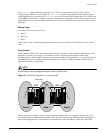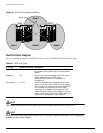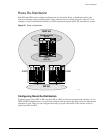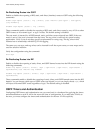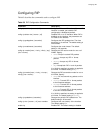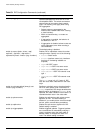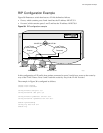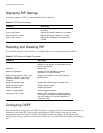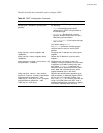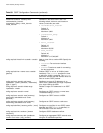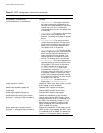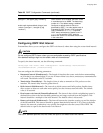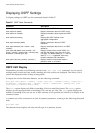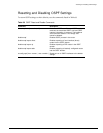
Configuring OSPF
Summit 200 Series Switch Installation and User Guide 221
Table 66 describes the commands used to configure OSPF.
Table 66: OSPF Configuration Commands
Command Description
config ospf add vlan <name> area <areaid>
link-type [auto | broadcast | point-to-point]
{passive}
Configures the OSPF link type. Specify one of
the following:
• auto—ExtremeWare automatically
determines the OSPF link type based on
the interface type.
• broadcast—Broadcast link, such as
Ethernet. Routers must elect a DR and a
BDR during synchronization.
• point-to-point—Point-to-point link type,
such as PPP.
The default setting is auto.
The passive parameter indicates that the
interface does not send or receive OSPF
packets.
config ospf vlan <name> neighbor add
<ipaddress>
Configures the IP address of a point-to-point
neighbor.
config ospf vlan <name> neighbor delete
<ipaddress>
Deletes the IP address of a point-to-point
neighbor.
config ospf [area <areaid> | vlan [<name> | all]]
cost [automatic | <number>]
Configures the cost metric of one or all
VLAN(s). If an area is specified, the cost metric
is applied to all VLANs currently within that
area. When automatic is specified, the
advertised cost is determined from the OSPF
metric table and corresponds to the active
highest bandwidth port in the VLAN.
config ospf [vlan <name> | area <areaid> |
virtual-link <routerid> <areaid>] authentication
[simple-password <password> | md5
<md5_key_id> <md5_key>| none | encrypted
[simple-password <password> | md5
<md5_key_id> <md5_key>]
Specifies the authentication password (up to
eight characters) or Message Digest 5 (MD5)
key for one or all interfaces (VLANs) in an
area. The md5_key is a numeric value with the
range 0 to 65,536. When the OSPF area is
specified, authentication information is applied
to all OSPF interfaces within the area.



